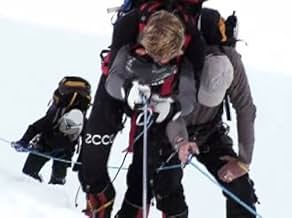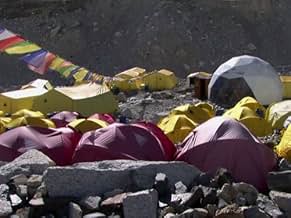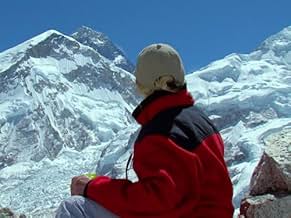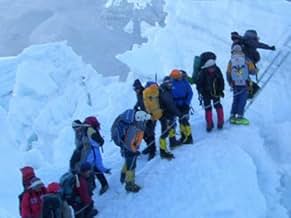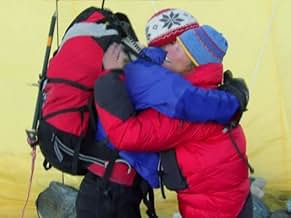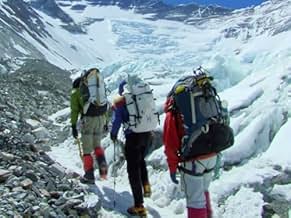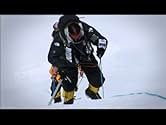Un equipo de producción sigue a equipos de escaladores, sus guías y sherpas en su intento anual de alcanzar la cumbre del Everest.Un equipo de producción sigue a equipos de escaladores, sus guías y sherpas en su intento anual de alcanzar la cumbre del Everest.Un equipo de producción sigue a equipos de escaladores, sus guías y sherpas en su intento anual de alcanzar la cumbre del Everest.
- Premios
- 1 premio ganado en total
Explorar episodios
Opiniones destacadas
As an armchair adventurer, I loved this series and the great camera and sound work that made it very real. The personalities are interesting and the dynamics between the expedition leader, the climbers and Sherpas provide plenty of drama for those of us who like to thrill-seek from the comfort of our living room. The only thing that might have made this series better was more of the in-depth interviews of the climbers and crew. I would have loved seeing the climbers returning home to their loved ones after their saga was over. Another thing I would have liked to have seen included is more of the behind- the-scenes footage of all the preparations that the leader, his crew, director and TV cameramen had to go through to get this documentary filmed .
I'm old, I'm isolating and running out of things that amuse me on the television. I came across this while looking through on demand shows. I am really enjoying it. I would never have climbed Everest even when I was young, but I have always been interested in stories about the people who do climb it. This is the best documentary I have seen with the combination of reality TV and kind of the inside story of how things work with these type of expeditions. I know it has its faults, but it's been something to loo forward to, to me. I am on series 2 and will watch series 3.
I once enjoyed watching movie named "Vertical Limit" - a true hint of mountaineer's consciousness and spirit. Only this time the highest Mountain will put mens' guts to the test you can find nowhere else.
The cameramen-sherpas have done outstanding job so the viewer is literally on the mountain with the expedition members witnessing their pain and struggle, defeat and victory. Plus the panorama views are almost to die for. This is the rarest scenery I have seen in my life so far! Both seasons are strongly recommended!
However, may be, people who have never been to the mountains themselves will not be able to appreciate in full this excitement, almost awe of the mens' spirit. :(
Overall, for me it's like the final breakthrough of Tim Robbins in "Shawshank Redemtion" only this time there are real people not just movie characters.
The cameramen-sherpas have done outstanding job so the viewer is literally on the mountain with the expedition members witnessing their pain and struggle, defeat and victory. Plus the panorama views are almost to die for. This is the rarest scenery I have seen in my life so far! Both seasons are strongly recommended!
However, may be, people who have never been to the mountains themselves will not be able to appreciate in full this excitement, almost awe of the mens' spirit. :(
Overall, for me it's like the final breakthrough of Tim Robbins in "Shawshank Redemtion" only this time there are real people not just movie characters.
10wmarzan1
Having seen the first four televised episodes I am very impressed with this documentary and look forward to it each week.
To me it represents a human struggle against severe elements both physiologically and psychologically, intertwined with human emotion and interaction in a competitive environment.
It's also quite a thrill to be able to see such a high quality production....and I applaud Discover Channel for televising it. This is a real reality show; people do and will continue to die up there each year.
It's all about calculated risks. So far we have seen two client climbers abort their attempts because they were listening to their own bodies. That, in my mind, the first line of defense. They are the smart ones in that by saving themselves they avoid putting others at risk higher up on the slopes. Self rescue is the #1 rule of survival in many extreme sports for the same reason. Plan your climb and climb your plan. If you are off plan for reasons within yourself or reasons beyond your control, GO DOWN.
We are getting a unique view of one particular team and I would say what we are seeing (and about to see) is repeated by many other teams up there during climbing season each year.
wmarzan1
To me it represents a human struggle against severe elements both physiologically and psychologically, intertwined with human emotion and interaction in a competitive environment.
It's also quite a thrill to be able to see such a high quality production....and I applaud Discover Channel for televising it. This is a real reality show; people do and will continue to die up there each year.
It's all about calculated risks. So far we have seen two client climbers abort their attempts because they were listening to their own bodies. That, in my mind, the first line of defense. They are the smart ones in that by saving themselves they avoid putting others at risk higher up on the slopes. Self rescue is the #1 rule of survival in many extreme sports for the same reason. Plan your climb and climb your plan. If you are off plan for reasons within yourself or reasons beyond your control, GO DOWN.
We are getting a unique view of one particular team and I would say what we are seeing (and about to see) is repeated by many other teams up there during climbing season each year.
wmarzan1
10photo-43
Rare is the in-depth series on a great adventure such as climbing Mt. Everest. This mini-series is one such, and for armchair alpinists, it is time well spent to follow this crew up the longest hill on the planet.
The human element is very much in play throughout -- the New Zealand climber trying to summit Everest after losing his legs in another climbing tragedy before, the Hollywood Harley designer climbing against all odds after being pieced together with screws and wires following a horrific motorcycle accident, the French man attempting the climb a mere two weeks after having a cancerous kidney removed. By any of our normal standards, these people living normals lives is a heroic feat. But these are not normal lives: they are on a quest to summit the world's tallest mountain and perhaps one of its most dangerous forbidden zones. A tall order for you or I, but for them, an even taller one -- and a challenge they cannot resist.
They are led by one of the world's great climbers, who nurses, kicks, leads and cajoles them to go forward, or in some cases, turn around while they still are relatively certain to get back down alive. Having lost 80% of his mates to climbing accidents, Russell Brice knows tragedy. As he says to one climber over the radio in one episode "I don't want to have to call your wife and tell her you've died on Everest." You can tell Russell Brice means what he's saying. And that the news he brings, good or bad, is indeed the way things are.
Some make the top and get back down, and others do not, turning around at different points on the climb. All gave it their all, in a place where that statement is literal, not figurative.
In short, if you want to get a great idea of what climbers see on their way up Everest, and also see glimpses of the suffering required to complete such and extreme challenge, then this show is for you.
The human element is very much in play throughout -- the New Zealand climber trying to summit Everest after losing his legs in another climbing tragedy before, the Hollywood Harley designer climbing against all odds after being pieced together with screws and wires following a horrific motorcycle accident, the French man attempting the climb a mere two weeks after having a cancerous kidney removed. By any of our normal standards, these people living normals lives is a heroic feat. But these are not normal lives: they are on a quest to summit the world's tallest mountain and perhaps one of its most dangerous forbidden zones. A tall order for you or I, but for them, an even taller one -- and a challenge they cannot resist.
They are led by one of the world's great climbers, who nurses, kicks, leads and cajoles them to go forward, or in some cases, turn around while they still are relatively certain to get back down alive. Having lost 80% of his mates to climbing accidents, Russell Brice knows tragedy. As he says to one climber over the radio in one episode "I don't want to have to call your wife and tell her you've died on Everest." You can tell Russell Brice means what he's saying. And that the news he brings, good or bad, is indeed the way things are.
Some make the top and get back down, and others do not, turning around at different points on the climb. All gave it their all, in a place where that statement is literal, not figurative.
In short, if you want to get a great idea of what climbers see on their way up Everest, and also see glimpses of the suffering required to complete such and extreme challenge, then this show is for you.
Selecciones populares
Inicia sesión para calificar y agrega a la lista de videos para obtener recomendaciones personalizadas
- How many seasons does Everest: Beyond the Limit have?Con tecnología de Alexa
Detalles
- Fecha de lanzamiento
- País de origen
- Sitio oficial
- Idioma
- También se conoce como
- Эверест: За гранью возможного
- Productora
- Ver más créditos de la compañía en IMDbPro
- Color
Contribuir a esta página
Sugiere una edición o agrega el contenido que falta

Principales brechas de datos
What is the English language plot outline for Everest: Beyond the Limit (2006)?
Responda
